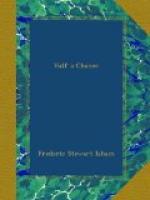Had Mr. Gillett delivered to his noble patron the memorandum book and other articles filched from John Steele’s pockets? That partly opened drawer—what did it contain? The nobleman’s hand lingered on the edge of it; with an effort the other resisted allowing his glance to rest there.
He even refused to smile when Lord Ronsdale, after a sharper look, asked him to be seated; he seemed to sift and weigh the pros and cons of the invitation in a curious, calm fashion; as if he felt himself there in some impersonal capacity for the purpose of solving a difficult catechetical problem.
“Yes; I think I will.” He sat down in a stiff, straight-backed chair; it may be he felt the need of holding in reserve all his physical force, of not refusing to rest, even here.
Lord Ronsdale’s glance narrowed; he hesitated an instant. “To go back to Strathorn House—a very beautiful place to go back to,” his tones for the moment lapsed to that high pitch they sometimes assumed, “Mr Gillett had there received from me certain instructions. Whatever you once were,” seeming not to notice the other’s expression, “you have since by your own efforts attained much. How—?” His brows knit as at something inexplicable. “But the fact remained, was perhaps considered. Exposure would have meant some—unpleasantness for your friends.” The eyes of the two men met; those of Lord Ronsdale were full of sardonic meaning. “Friends who had trusted you; who,” softly, “had admitted you to their firesides, not knowing—” he broke off. “They,” he still adhered to the plural, “would have been deeply shocked, pained; would still be if they should learn—”
“If?” John Steele did manage to contain himself, but it was with an effort; perhaps he saw again through the fog a girl’s face, white and accusing, which had appeared; vanished. “You spoke of certain instructions?” he even forced himself to say.
“Mr. Gillett, in the garden at Strathorn House, was authorized by me to offer you one chance of avoiding exposure, and,” deliberately, “the attendant consequences; you were to be suffered to leave London, this country, with the stipulation that you should never return.” John Steele shifted slightly. “You did not expect this,” quickly, “you had not included that contingency in your calculations?”
“I confess,” in an even, emotionless voice, “your lordship’s complaisance amazes me.”
“And you would have accepted the alternative?” The nobleman’s accents were now those of the service, diplomatic; they were concise but measured.
“Why discuss what could never have been considered?” was the brusk answer.
Lord Ronsdale frowned. “We are still fencing; we will waste no more time.” Perhaps the other’s manner, assured, contemptuously distant, goaded him; perhaps he experienced anew all that first violent, unreasoning anger against this man whose unexpected coming to London had plunged him into an unwelcome and irritating role. “That alternative is still open. Refuse, and—you will be in the hands of the authorities to-night. Resist—” His glittering eyes left no doubt whatever as to his meaning.




